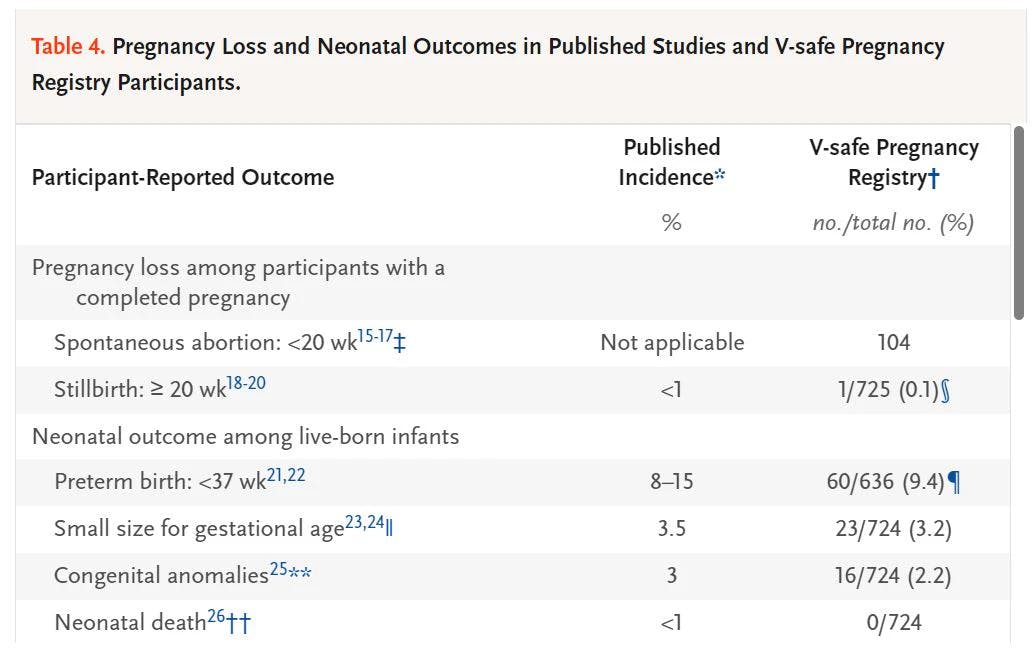Study Shows That Up To 8 In 10 Women Had A Miscarriage After Getting The Covid Vaccine Before The Third Trimester
A recent study in The New England Journal of Medicine has some shocking results about pregnant women who received the Covid vaccine early in their pregnancy.

The June 2021 study called “Preliminary Findings of mRNA Covid-19 Vaccine Safety in Pregnant Persons” purports to study the effects that the Covid vaccine has on pregnancies, including miscarriages, stillbirths, anomalies, and live births.
One particular finding – that related to miscarriages – has been seemingly overlooked (and perhaps even intentionally hidden, as some claim, since corrections were made to the report). But first, it’s important to keep in mind that miscarriages are defined as “the spontaneous loss of a pregnancy before the 20th week.” The general rate of miscarriages in the U.S. ranges from as low as 10% to as high as 26%, depending on the medical publication.
The study tracked 3,958 women who received the vaccine before and during pregnancy (the group was a mix of Pfizer–BioNTech and Moderna recipients). Among the women, 92 participants (2.3%) had received the vaccine before conception, 1132 (28.6%) received the vaccine in the first trimester, 1714 (43.3%) in the second trimester, and 1019 (25.7%) in the third trimester.
This is what the study found: “Among 827 participants who had a completed pregnancy, the pregnancy resulted in a live birth in 712 (86.1%), in a spontaneous abortion in 104 (12.6%), in stillbirth in 1 (0.1%), and in other outcomes (induced abortion and ectopic pregnancy) in 10 (1.2%). A total of 96 of 104 spontaneous abortions (92.3%) occurred before 13 weeks of gestation (Table 4), and 700 of 712 pregnancies that resulted in a live birth (98.3%) were among persons who received their first eligible vaccine dose in the third trimester.”

Okay, what do these statistics mean? Firstly, 827 women completed their pregnancy during the study, and 712 of them successfully gave birth. 700 of those 712 women who gave birth received their Covid vaccine in the third trimester.
Secondly, 104 of those 827 women experienced “spontaneous abortions,” i.e. miscarriages, with 96 happening in the first trimester. Now, initially, that looks like 1 in 8 women, which is 12.5% – which fits within the general miscarriage rate in the U.S. This calculation is similar to how the national average is calculated – just "how many pregnancies end in miscarriage" – without any special qualifications.
However, this study is focusing specifically on how the Covid vaccine impacts pregnancy, including by trimester. So to more precisely calculate the miscarriage rate, we have to remember that miscarriages, by definition, occur before the 20-week gestation mark. This means that all 700 women who received the vaccine in the third trimester must be excluded from the calculation because they were already past being able to have a technical miscarriage. So really, 104 out of 127 women experienced a miscarriage. This means the miscarriage rate of women who received the vaccine in the first or second trimester is actually 81.9%, or 8 out of 10 women – way, way above the national average.
Another thing to note is that this study is still ongoing, as 3,131 participants had not completed their pregnancy yet at time of publication, so these preliminary statistics will change. Right now, we're seeing two ends of the spectrum because of the short follow up window. Follow up occurred only two to three months later, which means the researchers had a higher probability of getting results at both ends of the spectrum – women who gave birth and women who miscarried early in their pregnancy. Once more follow ups are done over time, these numbers will change.
That being said, the study seems to overlook the miscarriage rate and to focus on the positive rates of third-trimester vaccination, concluding that “Early data...do not indicate any obvious safety signals with respect to pregnancy or neonatal outcomes associated with Covid-19 vaccination in the third trimester of pregnancy.”
Other researchers have analyzed the data from this study and have also calculated similar miscarriage rates. New Zealand researcher Dr. Aleisha Brock and Dr. Simon Thornley, a senior lecturer in the University of Auckland’s Section of Epidemiology and Biostatistics, calculated the incidence of miscarriage in women vaccinated before 20 weeks gestation was actually 82-91% in a paper published in Science, Public Health Policy, and the Law in November 2021.
“We question the conclusions of the Shimabukuro et al. study to support the use of the mRNA vaccine in early pregnancy, which has now been hastily incorporated into many international guidelines for vaccine use, including in New Zealand,” the researchers said.
“The assumption that exposure in the third trimester cohort is representative of the effect of exposure throughout pregnancy is questionable and ignores past experience with drugs such as thalidomide. Evidence of safety of the product when used in the first and second trimesters cannot be established until these cohorts have been followed to at least the perinatal period or long-term safety determined for any of the babies born to mothers inoculated during pregnancy,” they added.
Closing Thoughts
Since pregnant women were excluded from the trials of the experimental vaccine, they have been left to make their own best decision about which to risk – Covid or the vaccine. It’s hardly pro-woman not to make statistics like these transparent and public.